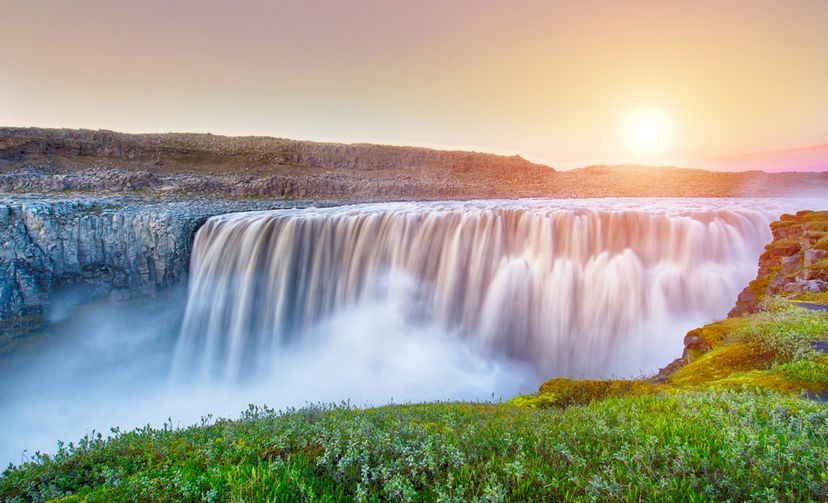
Thundering water, “smoking” water—these are just a couple of the ways people around the world have conceptualized waterfalls. No matter where in the world you live, you have a good idea of what a waterfall is. In all shapes and sizes, these landmarks and their majesty have captured the imagination of generations. The world is filled with amazing waterfalls and while picking a waterfall destination is never the wrong choice, there are some that are must-see locations—like the ones on this list. From highest to largest to widest, you should put the waterfalls down on your bucket list.
Advertisement
10. Ebor Falls, Australia
Named for a nearby town, Ebor Falls are a cascade-type waterfall formation on the Guy Fawkes River in the New England area of New South Wales, Australia. They are situated about 23 miles northeast of Wollomombi on the Waterfall Way, one of Australia’s most scenic drives. The upper falls plummet 115 meters in 2 cascades, while the lower falls, about 600 meters downstream, plunge into a steep, forested gorge. The falls are located in Guy Fawkes River National Park, and are popular with tourists, with nearly 80,000 people visiting in 2008. Viewing platforms, as well as rest areas and walking trails, are available. Camping is available at the nearby Cathedral Rock National Park, home of Round Mountain, about 6 kilometers west of Ebor. Ebor Falls have longer been recognized as a site for recreation and preservation; they were first protected in 1895.
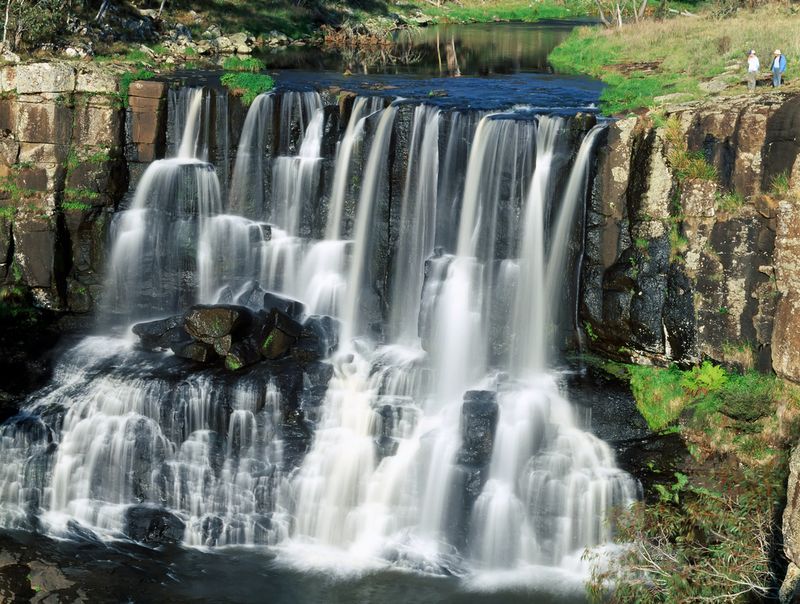
9. Gocta Cataracts, Peru
We like to think that there’s nothing left to discover on this planet of ours, but as the case of the Gocta Cataracts proves, nothing could be further from the truth. The Gocta Cataracts, about 430 miles northwest of Lima, the Peruvian capital, were a well-kept secret until 2005 when an expedition by Stefan Ziemendorff brought the falls onto the world stage. Ziemendorff convinced the Peruvian government to measure the falls’ height—a staggering 2,530 feet, making it one of the tallest in the world (although its exact ranking is disputed). Since discovery, the Peruvian government has developed the waterfall as a tourist attraction, building a hotel 6 miles from the base of the falls. Hiking trails and horse paths allow tourists to access the falls—which are said to be haunted by a beautiful mermaid. Given the falls’ altitude, at over 7,000 feet, clouds sometimes obscure the view.
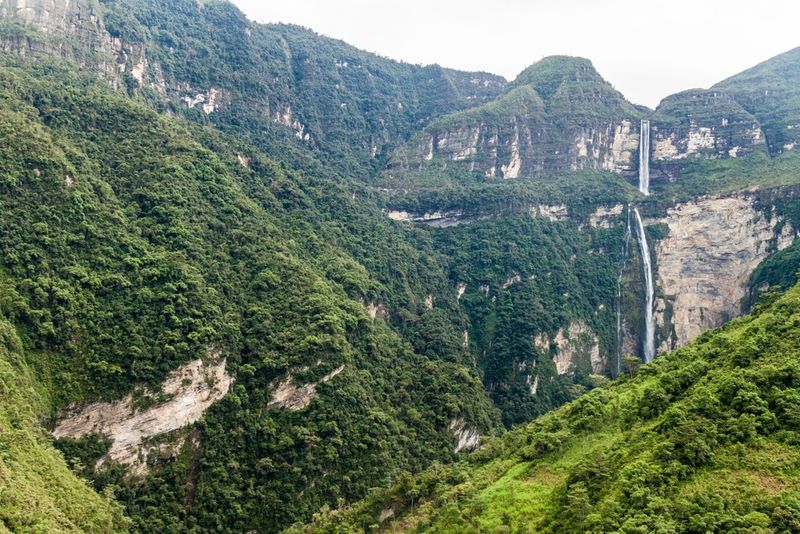
8. Humboldt Falls, New Zealand
New Zealand’s mountains are now famous, and where there are mountains, there’s a good chance you’ll find waterfalls. That holds true in the island-nation: in Hollyford Valley, in Fiordland, you’ll find the spectacular Humboldt Falls. The falls are nearly 1,000 feet high, with the water cascading down the rock face in 3 distinct steps. The largest of the 3 drops is 440 feet, almost 50% of the falls’ total height. The falls are a horsetail-type waterfall, and, despite their height, are relatively easy to reach. The trail from the falls, along Hollyford Road, is about 600 meters long and will take you about half-an-hour to navigate. The grade is relatively easy, allowing visitors to get close enough to glimpse some spectacular views of the waters of the Hollyford River rushing into the gorge below.
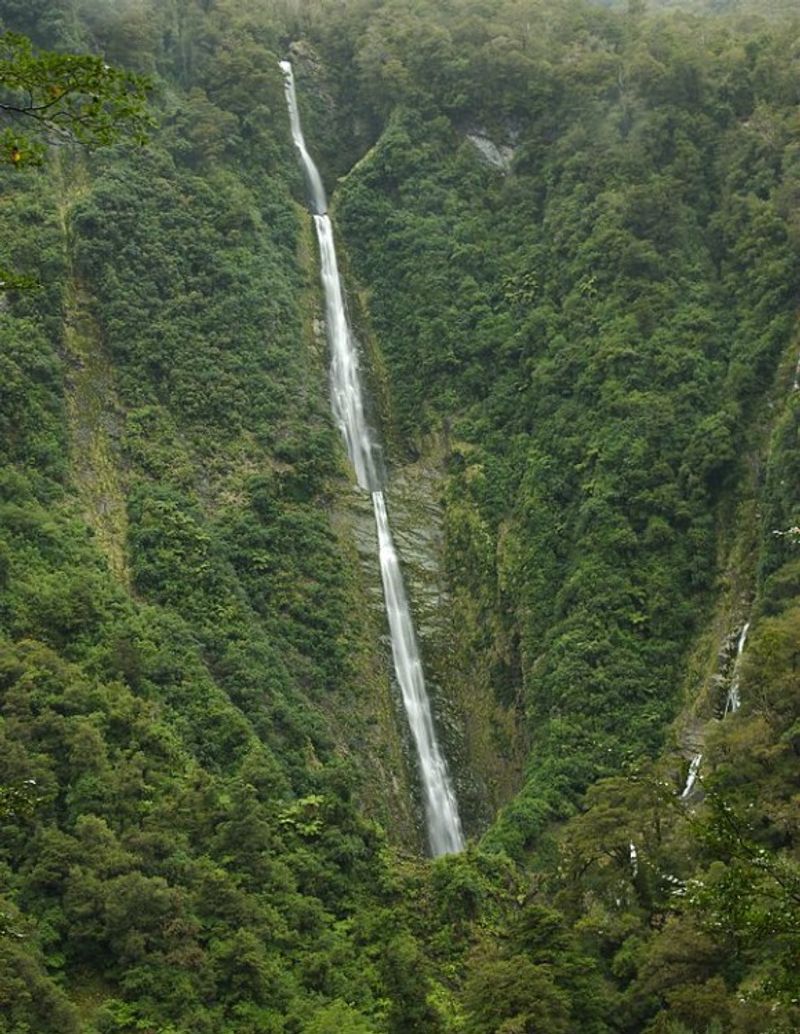
7. Trümmelbach Falls, Switzerland
Where there are mountains, there are waterfalls. Nowhere is that more true than in the soaring heights of the Alps. As snow and glaciers melt, the resulting water flows down the steep inclines, resulting in some spectacular feats of nature. The Trümmelbach is one of those feats: it drains the glacier defiles of Switzerland’s 3 most famous mountains, Eiger, Monch and Jungfrau. Up to 20,000 liters of water pass through the falls per second. The Trümmelbach is a series of 10 falls and they are actually located within the mountain, twisting and turning through the rockface as they rush to lower ground. The falls have been made accessible to tourists by tunnel-lift and they are illuminated for viewing. Viewing the glacial water plunging through the “Corkscrew Chute” is a glimpse into some of nature’s most secretive workings.

Advertisement
6. Huangguoshu Waterfall, China
The name of this stunning Chinese waterfall means “Yellow-fruit Tree Waterfalls.” Located on the Baishui River, it is one of the largest waterfalls in the whole country and in East Asia. It stands 255 feet high, with the main fall boasting a 220-foot drop. The falls span a width of approximately 330 feet. They are an example of a segmented block waterfall formation. The falls are considered a natural tourist draw and have been rated as an AAAAA scenic area by the China National Tourism Administration. Tourism is served by a special line of buses and 3 viewing platforms offering different views of the falls. Another attraction is Shuliandong, the Water-Curtain cave, a 440-foot cave that formed naturally at the back of the falls. There are several other waterfalls in the area, about 28 miles southwest of Anshun city.
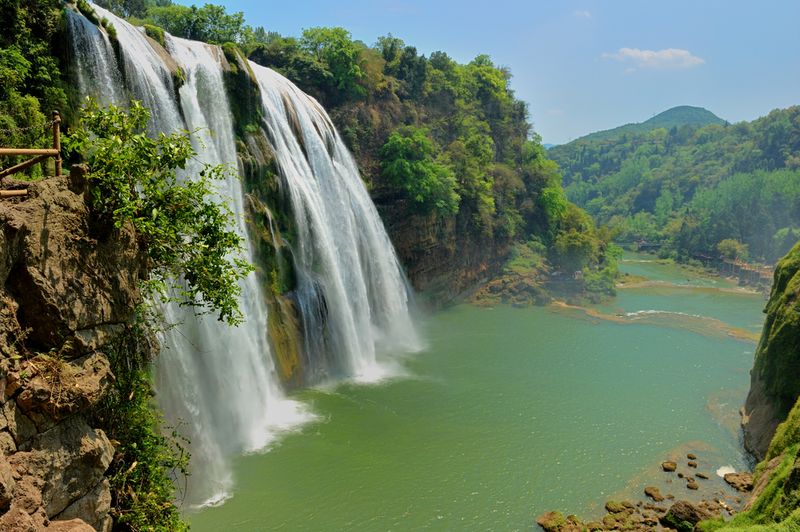
5. Dettifoss, Iceland
Dettifoss is the largest waterfall in Iceland, which says something as this island-nation is a place of many waterfalls. It’s also reputed to be one of the most powerful waterfalls in Europe, with an average flow of 193 cubic meters per second. The falls are 330 feet wide and plunge 150 feet into the Jökulsárglijúfur canyon. Located in Vatnajökull National Park in the northeast of the island, Dettifoss is situated on the Jökulsá á Fjöllum River, whose waters originate at the Vatnajökull glacier. A new road, finished in 2011, allows better visitor access. The waterfall is located on Iceland’s popular Diamond Circle tourist route, which also includes Húsavík and Lake Myvatn. The falls are a multi-step formation, which is a series of waterfalls of roughly the same size, each with its own sunken plunge pool.
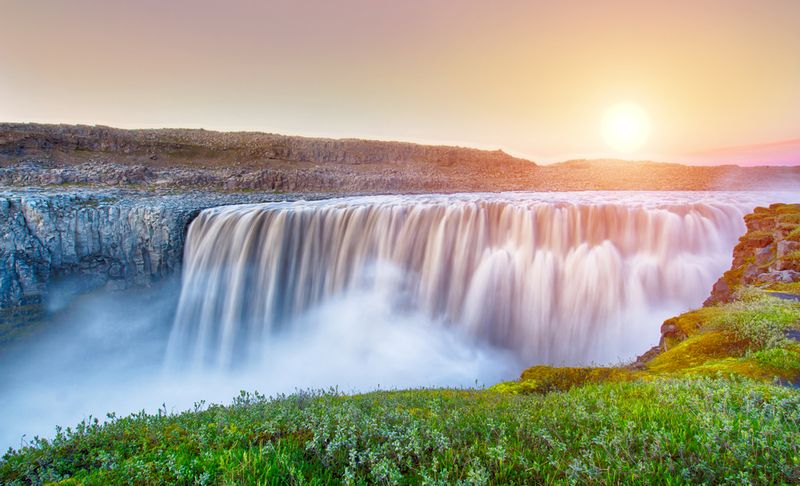
4. Iguazu Falls, Brazil/Argentina
Located along the border between Brazil and Argentina, Iguazu Falls are a sight to behold as they stretch along for more than 1.5 miles. Depending on the water level, there may be between 150 and 300 smaller waterfalls, most of them on the Argentine side of the border, with plunges between 197 and 269 feet. The main attraction is the Devil’s Throat, a U-shaped waterfall that spans nearly 3,000 feet. Perhaps the best feature of Iguzau’s structure is that it allows visitors to be surrounded by waterfalls up to 260 degrees at a time—not quite encircled, but close. Iguazu is wider and discharges more water than the equally impressive Victoria Falls in Zimbabwe and Zambia. Tourism in the area is well developed, and the falls can be reached from either the Brazilian or Argentine side, as well as from Ciudad del Este in Paraguay.
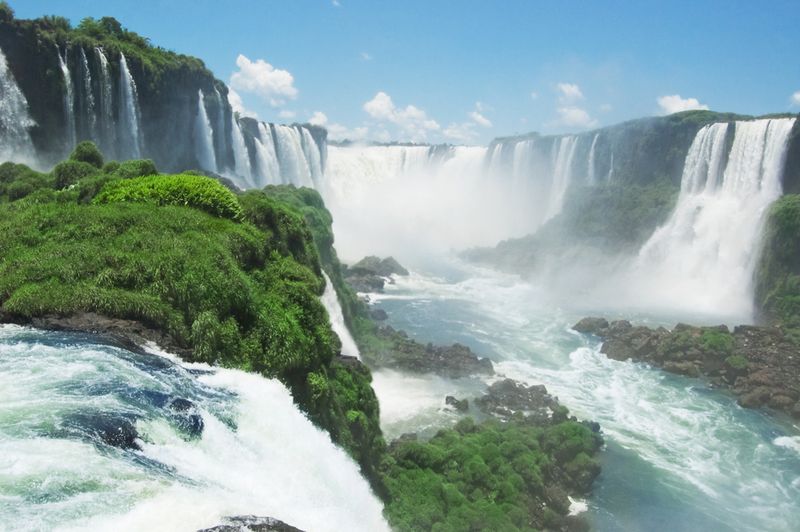
3. Angel Falls, Venezuela
If you’ve seen Pixar’s Up, you’ve seen Angel Falls. The Venezuelan waterfall is well known to people around the world. Part of its fame comes from the fact that it is indeed the world’s highest uninterrupted waterfall—the plunge is an astounding 2,648 feet. The official height given by the Venezuelan state and UNESCO is 3,212 feet, which includes sloped cascades, rapids below the drop and another plunge downstream. The falls were given their current name in honor of Jimmie Angel, an American aviator. In 2009, the Venezuelan president indicated his intention to give the indigenous name to official status. Although the indigenous people were aware of the falls before Angel’s 1933 flight, they did not visit the area and it was not known to the outside world. Today, the falls are a popular tourist attraction, despite the difficulty in reaching them through isolated stretches of jungle.
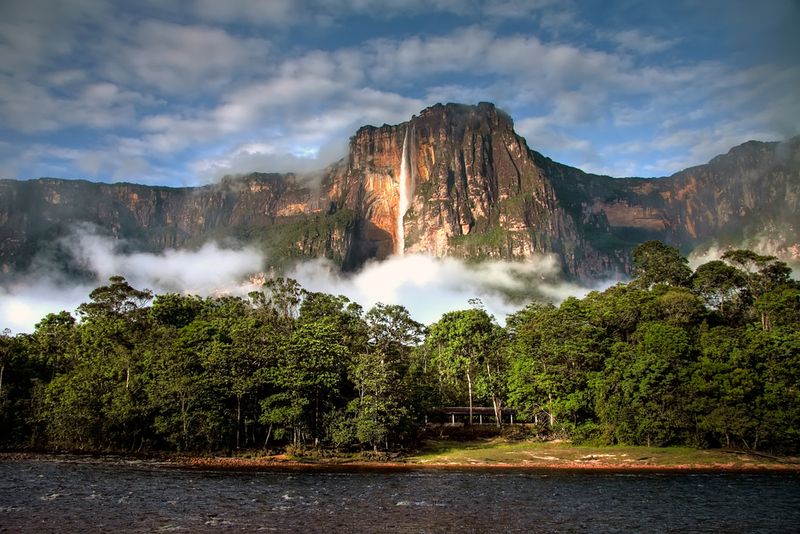
2. Niagara Falls, Canada/USA
Along the Canadian-American border lies Niagara Falls, which drains Lake Erie into Lake Ontario. The Horseshoe Falls on the Canadian side, named for their shape, are larger and more renowned than the (still impressive) American falls. The distinctive color of the water flowing over the drop is a by-product of finely ground rock dust and dissolved salts, which occur in the water because of the erosive power of the Niagara River and the falls. Currently, erosion moves the falls back about 1 foot per year. The falls were already a huge tourist attraction in the late 19th century, and they continue to be a popular attraction today, with many hotels, casinos and excursions available to visitors. It is also a popular location for honeymooners and for film and television.
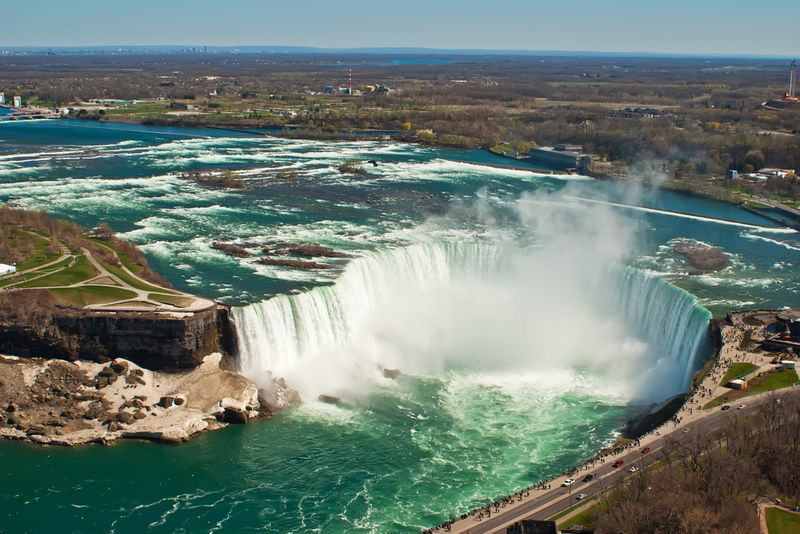
Advertisement
1. Victoria Falls, Zambia/Zimbabwe
Located near the Zambia-Zimbabwe border, Victoria Falls is the widest waterfall in the world, which results in the largest sheet of falling water. While other falls may be wider, many of these actually contain several distinct falls; Victoria Falls is a single flow. The falls are viewable from both the Zambian side and the Zimbabwean side; traditionally, the Zimbabwean side was more popular with tourists, but recently the number of visitors to the Zambian side has been increasing. The Zimbabwean government has considered renaming the falls to Mosi-oa-Tonya, the indigenous name for the formation. The name means “the smoke that thunders.” The falls are also a UNESCO World Heritage Site, although extensive tourist development in the area has led the UN to reconsider this designation. Nonetheless, the falls remain majestic to see at peak flow in April. In the dry season, it is possible to walk through the First Gorge.
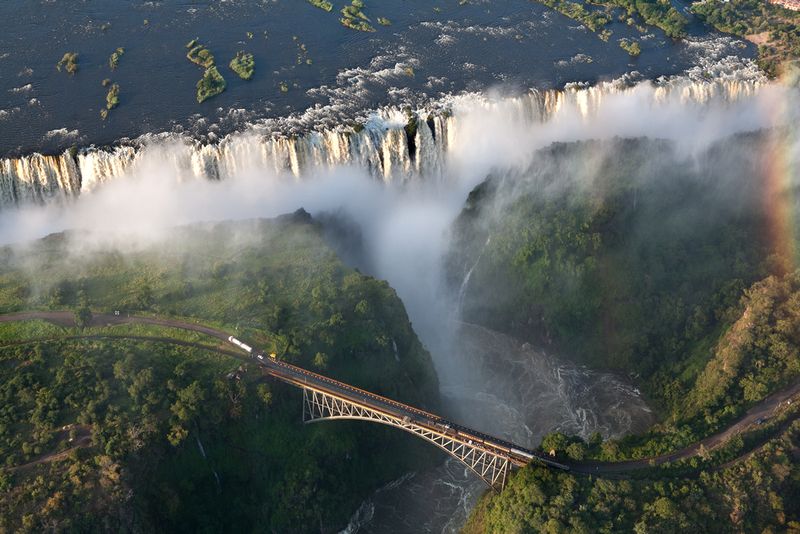
Advertisement